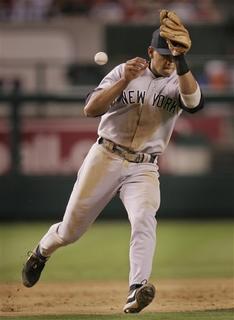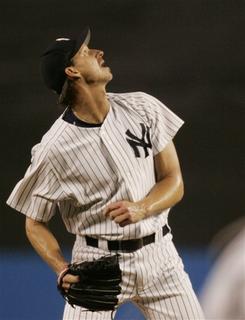If I had told you two weeks ago that the Yankees would have held the Angels' leadoff hitter to a .143 batting average, that these "Runnin'Angels" would steal only one base in the series and that the Angels cleanup hitter would not drive in a run, you'd have thought the Yankees would win, wouldn't you? Well, you'd be wrong.
How about if I told you that the Angels' ace pitcher would not win a game in the series, or for that matter, neither would any of their other starters? You'd have thought the Yankees would win that series, wouldn't you? Wrong again.
What if I told you that Derek Jeter would hit two homers in the series and that the Yankees' #3 hitter, Jason Giambi would hit .421(!)? What if I told you that Chien Ming Wang and Shawn Shacon would combine to allow only 3 earned runs in 13 innings of work, and that Randy Johnson would finish the 7th inning of the deciding game without having allowed a run in it? That in the five-game series the Yankees would draw 24 walks allow only five? Sounds like a sure Yankee victory, doesn't it?
Strike three. You're not very good at this, are you?
Well, it turns out that certain Yankees aren't very good at playing baseball in the postseason, either. While Jeter did his best to carry the rest of the team on his back, with two homers, 5 RBI and a .333 average, his successor in the lineup, Alex Rodriguez, hit only .133 with ZERO RBIs. Furthermore, he got caught stealing once and grounded into two double plays, so he made 19 outs in 22 plate appearances, which is, of course, a statistical anomaly, but it's also atrocious and a huge part of why the Yankees eventually lost the series. (For the record, he also made an error in Game Two, which eventually allowed the tying run to score.) Rodriguez was being called the "unclutchest" player in postseason baseball history by some of the AM sports talk radio personalities on Tuesday morning. You know, if they have to add a word to the language to describe how bad you are, things are not going well. 
But before you crucify A-Rod, know that there is plenty of blame to go around. Randy Johnson may have pitched into the seventh inning of Game Five without allowing a run, but because starter Mike Mussina allowed five runs before getting out of the third inning, Johnson's relief efforts offered little relief as the Yankees struggled to score runs all day. The Big Unit also came up very small in Game Three, surrendering five runs in three innings and pressing the bullpen into service much sooner than expected, even though he didn't take the Loss. That dishonor was given to Aaron Small, who went 10-0 in the regular season, based on a little luck and a lot of guile, both of which ran out at the end of September, apparently. 
Also running out at the end of September was the Yankees' lineup's abilities to hit for average and/or power, with the noted exceptions of Jeter and Giambi. During the regular season, the Yankees had five regular players hit .290 or better and a team batting average of .276. In the postseason? Two guys, and .253 collective BA. During the regular season, seven regulars plus Tino Martinez had a slugging percentage of .430 or better, but in the LDS, only three (though Cano was close at .421). The team got on base often enough, a .351 team OBP that was very close to their regular season mark of .355, which missed leading the major leagues by 0.001, but because they didn't hit for any power, they could not bring baserunners home, and therefore could not win.
If I may say so, the Angels got some help from the umpiring crew as well, at least in Game Five. Home Plate Ump Joe West called one of the least consistent strike zones I have ever seen, which generally seemed to be about eight inches wide and four feet tall, though it sometimes got considerably wider (and no shorter) if the Yankees had runners on base.
More importantly, West was also responsible for calling Robinson Cano out for running outside the baseline to end the fifth inning. Cano had struck out but ran to first on a passed ball and was safe when Angels' 1B Darin Erstad missed the throw from catcher Bengie Molina. Erstad set up across the 1B bag, effective blocking Cano's path, which is also against the rules if you don't already have the ball, though West didn't seem to mind that. Cano was running along the foul line, right on it the entire way, as shown by the replay, and Erstad could have set up with his left foot on first base and fielded the throw easily if Molina had thrown it that way, but neither of those things happened. At best, this was a too-close-to-call kind of situation, and you hate to see an umpire step in and swing the game around like that if it's not obvious. It's always better to see the players decide things on the field than to win or lose on a technicality. To wit, the next "batter" was Bernie Williams, who hit only .211 for the series and got only one hit with runners on base in the entire series, so perhaps even with the bases loaded and two out, the Yankees' hopes would have been dashed, but it sure would have been nice to play it out, you know?
Still, though, even this is the Yankees' fault. Branch Rickey may have been dead for almost 40 years, but luck is still the residue of design, and if the Yankees had taken care of business and gotten better hitting and/or pitching when they needed it, then a call like this would not have affected them so adversely. Isn't that right, Chuck?
Kudos to the Angels, who overcame injuries and illness to their starting pitchers, atrocious hitting by Steve Finley, Chone Figgins and Orlando Cabrera, and a complete lack of patience by the entire lineup, to win the series. They got just enough baserunners on, got key hits when they needed them, and their bullpen made fools of the Yankee lineup. The road to the World Series goes through the Bronx, as the last four teams to win it had to eliminate the Yankees to do so.
Here's hoping that particular streak ends now.





No comments:
Post a Comment